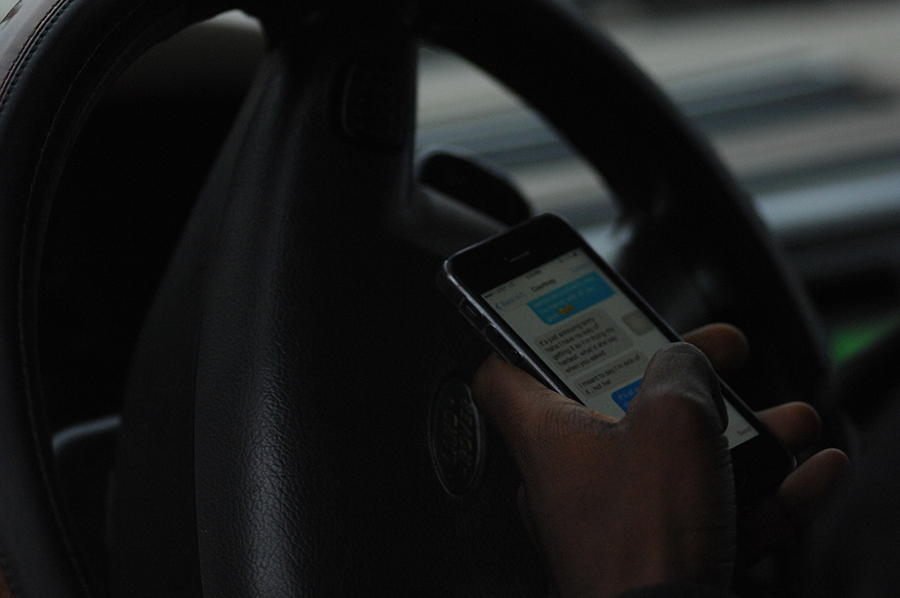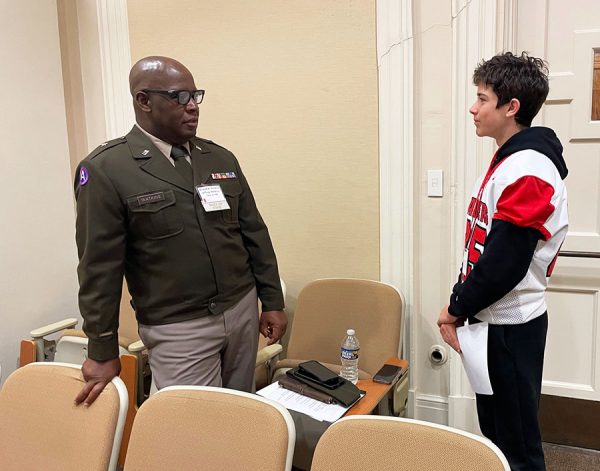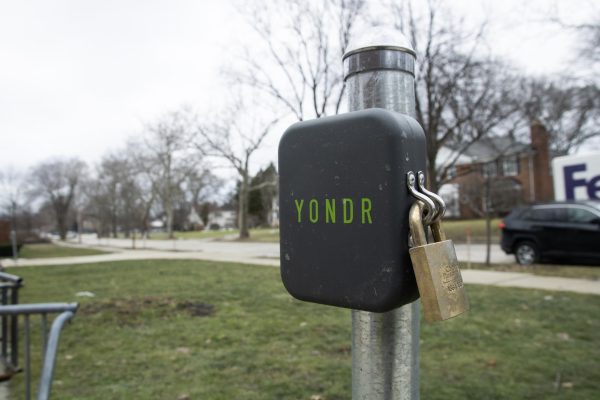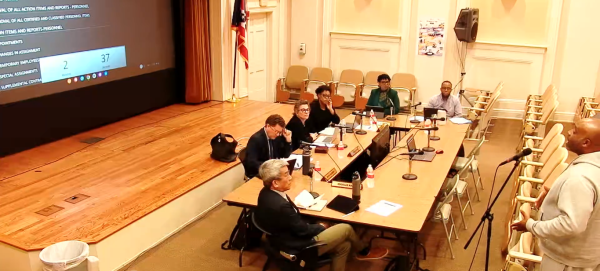City Council Considers Ban on Cell Phone Use While Driving
Ordinance Proposed for Safety Reasons
A student texts a friend while parked near the high school on Nov. 11.
The Shaker Heights City Council is considering a ban on all use of handheld electronic devices while driving.
“It’s what I think is probably the future,” Shaker Heights Police Chief Scott Lee said. “We keep putting technology in our vehicles.”
In its proposed form, the new law would ban making phone calls while driving, holding the device in the driver’s hand and keeping the device in the driver’s lap. Using an electronic device as a GPS, provided that the driver listens to spoken instructions rather than looking down at the device, would be allowed. Bluetooth and similar headsets, too, would remain legal.
Currently, Shaker follows the state ban on texting while driving. Ohio law cites texting while driving as a secondary offense, meaning police officers may not pull drivers over for the charge.
If the proposed ordinance were to pass, all cell phone use while driving would become a primary offense, meaning police officers could pull over drivers seen using their devices while driving.
“What’s really important to understand is that this legislation . . . is kind of in line with what the state has already decided to do,” Lee said. “The [proposed] ordinance allows the police officer to make a stop on the individual and advise the individual either through the citation or the warning that their activity is illegal in this city.”
Councilman Jim Brady sees flaws in the proposed legislation. He thinks the ordinance “basically says you can’t do anything with your phone while you’re driving, and I just think that’s taking it a little too far,” he said. “Prior to everyone texting, people would talk on their phones, and I don’t think there was mass hysteria because people were driving off the roads. . . . Even though our Shaker Heights Police Department is awesome, I just think it’s a step too far.
“People are distracted for a lot of other reasons,” Brady added. “People drive every day with one hand. When you’re driving changing your radio station, you have one hand on the wheel. When you’re driving and, I don’t know, a mom that’s driving and has a kid in the backseat that she’s handing a bottle, she’s distracted, she doesn’t have both hands on the wheel. There’s lots of things,” he said. “I just think that it’s just an excuse to get the ordinance pushed through.”
Councilwoman Nancy Moore disagreed. “I think that the consistency of law is very important, and what we have developing around us is a movement within the state, as well as Beachwood and Pepper Pike have ordinances, too, to prohibit the use of texting. Some also have the use of the cell phones prohibited,” she said. “I think to have a person go from Beachwood, where it’s illegal, to Shaker, where it’s legal, is more than a little bit inconsistent.”
Shaker’s Law Director William Gruber, who drafted the ordinance, said, “Minors are not allowed to use a cell phone at all, but adults are not prohibited from talking on a cell phone; they are only prohibited from texting. So one of the things we always think of from the legal side is not just . . . whether something should or shouldn’t be illegal, but how can it be enforced.
“Enforcement is not impossible with the current state law, it’s just more difficult because first of all, it’s a secondary offense under state law, not a primary offense,” he said. “You’re stopping someone for driving erratically, going through a stop sign, speeding or some other violation, and then if you see a cell phone, how do you determine, if you’re an officer, that the person was actually texting on the phone?”
Junior Zach Reizes agreed the ordinance may be useful. “I think that it’s a good idea because accidents are often caused by distraction,” he said. “However, I’d like to see the data of accidents in Shaker to back it up.”
Shaker does not have statistics about how many car accidents are related to cell phone use within the city. However, at the meeting, Gruber presented national statistics about the matter. According to a study by the National Safety Council in 2011, at least 23 percent of car accidents nationwide involve use of handheld electronic devices while driving, equating 1.3 million crashes.
Gruber also presented findings from two separate papers published in “Human Factors: The Journal of the Human Factors and Ergonomics Society” in 2006. The studies found that cell phone use while driving slows drivers’ reaction times, with impairments on drivers’ awareness that can mirror the dangers of drunk driving.
Though Shaker does not have its own statistics, “what happens in other places will happen in Shaker, too,” Mayor Earl Leiken said. “It’s an identical problem, an identical issue.
“Unfortunately, while it’s convenient for people to use their cell phones while driving, it does raise safety issues,” Leiken said. “So I would be likely to be supportive of this issue.”
“Maybe a warning system – three strikes, you’re out – would be better,” Reizes said, “but whatever it takes to make Shaker safer.”
“I’ve driven for 42 years, and for all but five of them, maybe, I didn’t have a cell phone,” Gruber said. “I think I survived perfectly well without using a cell phone while driving for 40 years, almost 40 years, and I think I can survive in the future without it.”
The ordinance “was prepared first for a meeting of the Safety and Public Works Committee in September, and then it came again in front of the committee in October, and then went to council for its first reading on Monday [Oct. 28],” Gruber said. Because the City Council’s “rules call for every ordinance to be read three times before passage,” the proposed law will go through two more readings before council members vote on its passage.
“I think that we’ll pass it, but not unanimously,” Moore said. “I think that there will be a difference of opinion. But I could be wrong. Even though there’s difference of opinion at the beginning, on a first read, I’m sure anybody who might have a difference of opinion will go to the police chief between now and then, go to the prosecutor and have a discussion.”
Brady agreed that the law would probably be passed. Lee, Gruber and Leiken declined to speculate about its prospects.
Leiken said the ordinance’s final reading will probably be Nov. 25.





